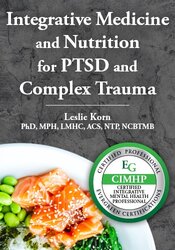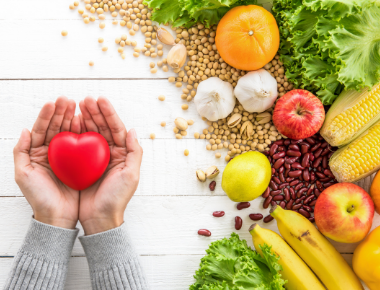10 Ways to Improve Mood with Food
Integrative strategies to reduce trauma symptomatology

They may be going to several providers, some to deal with pain, some to deal with digestion, and some to deal with emotional distressãÎand yet theyãd most benefit from someone who could help them understand their different symptoms as manifestations of the same types of dysregulation.
Thatãs why I believe nutritional therapy is absolutely the most important missing piece in trauma treatment today.
Want to get started? Here are 10 things you can do to help your clients improve their mood with food. If youãre not already doing these for yourself, I encourage you to try them as well.
1. Treat The Kitchen As Your Pharmacy
When we talk about nutrition, thereãs this saying that asking someone to change their diet is like asking someone to convert to a new religion, but this approach is non-ideological. We have to release ourselves from the myths of what a ãgood dietã is and instead learn the science of foods and how the kitchen truly gives us so many nutrients, like anti-inflammatory herbs and antioxidants.For example, ginger and turmeric are two powerful anti-inflammatories that we can use daily to reduce pain and thereby reduce the use of NSAIDs. Once we help our clients understand that the foods they prepare and eat can heal them, we can often see a turning point in their symptoms.
2. Use Food Preparation as Mindful Self-Care
Food preparation is mindful self-care, and that's how I frame it when my clients say theyãre too busy or that making their own food is too expensive. Take the role of educator: find what foods your clients like and what might be missing from their diet. Would they consider getting a $30 slow cooker and learning to make chicken broth or beef stew? You can work together to begin to build a repertoire one dish at a time.3. Become Aware How ãMood Follows Foodã
One tool I like to use is the . Itãs a simple exercise that has clients write about what they eat every day and then keep track of how they feel. I often work with clients to identify how they feel after having their donut and third cup of coffee. How can we begin to reduce this addiction to sugar and stimulant foods?A good starting point is helping your clients develop some awareness. For example, if they have frequent headaches, is it because theyãre not drinking enough water? Then, you can work together to explore how dehydration is causing their headaches, which in turn is leading them to take NSAIDs, which is leading to gut pain, and ultimately to antacid use.
Weãre working together to unravel the underlying cause together. Taking this approach allows you to find where the problem truly starts and address it at its source.
4. Consider Food Prep & Eating as Social Self-Regulation
We regulate through gathering together to prepare and eat food. In many ways, itãs become a lost art in our very busy modern lives, but this is something I encourage my clients to cultivate.Maybe one day a week the entire family participates in going to the store and picking out some of their favorite fresh fruits and vegetables. For people who live alone, consider having them engage with friends or family in person or over Zoom.
5. Practice Chewing as Mindfulness
When we eat, our saliva has enzymes that start breaking down carbohydrates. When we donãt take the time to chew and instead swallow our food whole, weãre not allowing the time for the enzymatic action necessary to fully break down our food. This leads to a whole cascade of digestive problems.One simple thing you can do with clients is a mindful exercise. I keep a bowl of raisins in my office and ask clients to put one in their mouth and feel it: feel the texture and sweetness, roll it around, and become aware of the sensation. I ask them to carry that mindful exercise through to when they're eating at home: to sit and relax before they eat, and then to consciously become aware as they're chewing to truly break down the food.
6. Become Aware of How You Use Stimulant Foods
Consider coffee. It enhances dopamine, improves mood, sharpens focus, and enhances peristaltic action (the undulating muscular action of the colon to release waste). However, when we consume too much, we can slip into insomnia, anxiety, and too much acid in the gut.Whether itãs nutrition, herbs, or yoga, we need to find the right amount and the right approach for our client at the right time. Coffee can be a wonderful natural stimulant with therapeutic effects, but many people use too much of it and have the negative side effects.
Simple psycho-education can serve to enhance our clientsã awareness and help them strengthen their self-care muscle, making them more aware of how theyãre treating themselves.
7. Recognize Foods Can Be Used for Healthy ãSelf Medicationã
Thereãs nothing wrong with some forms of self-medicating, like drinking chamomile tea when you feel anxious or having a cup of hot cocoa to improve mood.The challenge is making sure we are self-medicating with healthy foods. This doesnãt require abstinence or being an ascetic; itãs about enhancing self-care through good choices that help us feel better in our daily lives.
8. Sugar Is The Biggest Culprit
Sugar is addictive ã thereãs no question about it. It also creates extensive behavioral issues and increases inflammation in the body. We know through scientific research that by decreasing inflammation, then we can decrease the presence of disorders like anxiety and depression.9. Enact the ãKorn Principles of Substitutionã
Once we understand what weãre craving, we can come up with healthy ways to nourish our bodies.For example, you can make a delicious healthy hot cocoa by using organic cocoa sweetened with a little honey and paired with almond milk. Chocolate is rich in magnesium and theophylline, which is a mood booster. It can even help us focus, which is why a healthy chocolate snack can be great in the afternoon.
10. Enjoy! No Shame, Just Awareness of Self Care & Self Nourishment
In so many ways, trauma takes the enjoyment, purposefulness, and sense of connection out of our clientsã lives. Our work as clinicians focuses on many things, but it includes enhancing their capacity to enjoy things once again, including the taste of food and the sensation of being full.Thereãs no shame about anything we do in this approach. Itãs about helping our clients become aware of what they need to do for themselves at each stage of their trauma recovery and collaborating to achieve lasting progress.

She is the author of the seminal book on the body and complex trauma: Rhythms of Recovery: Trauma, Nature and the Body (Routledge, 2012), Nutrition Essentials for Mental Health (W.W. Norton, 2016), Eat Right Feel Right: Over 80 Recipes and Tips to Improve Mood, Sleep, Attention & Focus (¤Öêüë½, 2017), Multicultural Counseling Workbook: Exercises, Worksheets & Games to Build Rapport with Diverse Clients (¤Öêüë½, 2015) and The Good Mood Kitchen (W.W. Norton, 2017). She was a founder of the National Certification Board for Therapeutic Massage and Bodywork, a Fullbright scholar in Herbal Medicine and an NIH-funded scientist, in mind/body medicine. She is an approved clinical supervisor and is the research director at the Center for World Indigenous Studies where she designs culinary and herbal medicine programs with tribal communities engaged in developing integrative medicine programs.
Learn more about their educational products, including upcoming live seminars, by clicking here.
Topic: Diet and Nutrition
Tags: Advice | Body | Diet and nutrition | Healthy food | How To | Mindfulness | Strategies | Success | Wisdom



